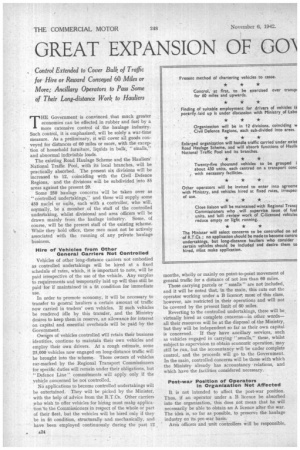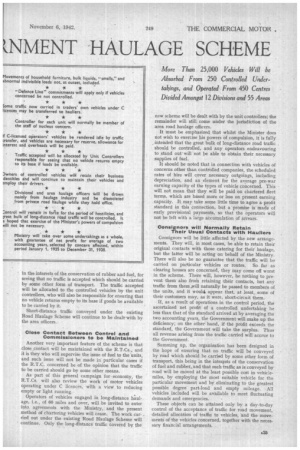GREAT EXPANSION OF GO - \
Page 26

Page 27

If you've noticed an error in this article please click here to report it so we can fix it.
NMENT HAULAGE SCHEME
THE Government is convinced that much. greater economies can be effected in rubber and fuel by a more extensive control of the haulage industry. Such control, it is emphasized, will be solely a war-time measure. As a preliminary, it will cover all goods conveyed for distances of 60 miles or more, with the exception of household furniture, liquids in bulk, "smalls," and abnormal indivisible loads.
The existing Road Haulage Scheme and the Hauliers' National Traffic Pool, with its local branches, will be practically absorbed. The present sic divisions will be increased to 12, coinciding with the Civil Defence Regions, and the divisions will be subdivided into 55 areas against the present 20.
Some 250 haulage concerns will be taken over as "controlled undertakings," and these will supply some 450 nuclei or units, each with a controller, who will, normally-, be a member of the staff of the controlled undertaking, whilst divisional and area officers will be drawn mainly from the haulage industry. Some, of course, will be the present staff of the existing scheme.
. While they hold office, these men must not be actively associated with the running of any private haulage business.
Hire of Vehicles from Other General Carriers Not Controlled
Vehicles of other long-distance carriers not embodied as controlled undertakings will be hired at a fixed schedule of rates, which, it is important to note, will be paid irrespective of the use of the vehicle. Any surplus to requirements and temporarily laid up will thus still be paid for if maintained in a fit condition for immediate use.
In order to promote economy, it will be necessary to transfer to general hauliers a certain amount of traffic now carried in traders' own vehicles. If such vehicles be rendered idle by this transfer, and the Ministry desires to keep them in reserve, an allowance for interest on capital and essential overheads will be paid by the Government.
Owners of vehicles controlled Will retain their business identities, continue to maintain their own vehicles and employ their own drivers. At a rough estimate, some 25,000 vehicles now engaged on long-distance traffic will be brought into the 'scheme. Those owners of vehicles ear-marked by the Regional Transport Commissioners for specific duties will remain under their obligations, but "Defence Line" commitments will apply only if the vehicle concerned be not controlled,.
No applications to become controlled undertakings will be entertained. They will be picked by the Minister, with the help of advice from the R.T.Cs. Other carriers who wish to offer vehicles for hiring must make application'to the Commissioners in respect a the whole or part of their fleet, but the vehicles will be hired only if they be in fit condition, structurally and mechanically, and have been employed continuously during -the past 12
months, wholly or mainly on point-to-point movement of general traffic for a distance of not less than 60 miles.
Those carrying parcels or "smalls" are not included, and it will be noted that, in the main, this cuts out the operator working under a B licence-, most of this class, however, are restricted in their operations and will not be covered by the present limit of 60 miles.
Reverting to the controlled undertakings, these will be virtually hired as complete concerns—in other words— all their resources will be at the disposal of the Ministry, but they will be independent so far as their own capital is concerned. If they have ancillary services, such as vehicles engaged in carrying smalls," these, whilst subject to supervision to obtain economic operation, may still be run, but the accountancy will be under complete control, and the proceeds will go to the Government. In the main, controlled concerns will be those with which the Ministry already has accountancy relations, and which have the facilities considered necessary.
Post-war Position of Operators In Organization Not Affected
It is not intended to affect the post-war position. Thus, if an operator under a B licence be absorbed into the organization, this does not mean that he will necessarily be able to obtain an A licence after the war. The idea is, so far as possible, to preserve the haulage industry on its pre-war basis.
Area officers and unit controllers will be responsible, in the interests of the conservation of rubber and fuel, for seeing that no traffic is accepted which should be carried by some other form of transport. The traffic accepted will be allocated to the controlled vehicles by the unit controllers, who will also be responsible for ensuring that no vehicle returns empty to its base if goods be available to be carried by it.
Short-distance traffic conveyed under the existing Road Haulage Scheme will continue to be dealt with by the area officers.
Close Contact Between Control and Commissioners to be Maintained Another very important feature of the scheme is that close contact will be maintained with the R.T.Cs., and it is they who will supervise the issue of fuel to the units, and such issue will not be made in particular cases if the R.T.C. concerned be of the opinion that the traffic to be carried should go by some other means.
As part of this general campaign for economy, the R.T.Cs. will also review the work of motor vehicles operating under C licences, with a view to reducing empty or light running.
Operators of vehicles engaged in long-distance haulage, i.e., of 60 miles and over, will be invited to enter into agreements with the Ministry, and the present method of chartering vehicles will cease. The work car-. ried out under the existing Road Haulage Scheme will continue. Only the long-distance traffic covered by the
new scheme will be dealt with by the unit controllers; the remainder will still come under the jurisdiction of the area road haulage officers.
It must be emphasized that whilst the Minister does not wish to exercise his powers of compulsion, it is fully . intended that the great bulk of long-distance road traffic . should be controlled, and any operators endeavouring to stand out• will not be able to obtain their necessary supplies of fuel.
It should be noted that in connection with vehicles of concerns other than controlled companies, the scheduled rates of hire will cover necessary outgoings, including depreciation, and an element for the average pre-war earning capacity of the types of vehicle concerned. This will not mean that they will be paid on chartered fleet terms, which are based more or less on present earning capacity. It may take some little time to agree a profit standard in this connection, but a promise is made of early provisional payments, so that the operators will not be left with a large accumulation of arrears.
Consignors will Normally Retain Their Usual Contacts with Hauliers
Consignors will be little affected by the new arrangements. They will, in most cases, be able to retain their original contacts with those catering for their haulage, but the latter will be acting on behalf of the Ministry. There will also be no guarantee that the traffic will be carried on particular vehicles or routes. So far as clearing houses are concerned, they may come off worst in the scheme. There will, however, be nothing to prevent them also froni retaining their contacts, but any traffic from them :NA naturally be passed to members of the units, and it woul4 appear that, at least, some of their customers may, as it were, short-circuit them.
If, as a result of operations in the control period, the ascertained net profit of a controlled undertaking be less than that of the standard arrived at by averaging.the two accounting years, the Government will make up the deficiency; on the other hand, if the profit exceeds the standard, the Government will take the surplus. Thus all revenue arising from the traffic carried will accrue to the Government.
Summing up, the organization has been designed in the hope of ensuring that no traffic will be conveyed by road which should be carried by some other form of transport, this being in the interests of the conservation of fuel and rubber, and that such traffic as is conveyed by road will be moved at the least possible cost in vehiclemiles, by employing the most suitable vehicle for the particular movement and by eliminating to the greatest possible degree part-load and empty mileage. All vehicles included will be available to meet fluctuating demands and emergencies.
These objects can be attained only by a day-to-day control of the acceptance of traffic for road movement, detailed allocation of traffic to vehicles, and the movements of the vehicles concerned, together with the necessary financial arrangements.




















































